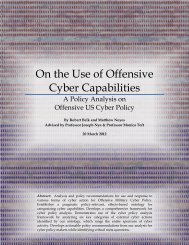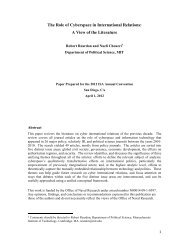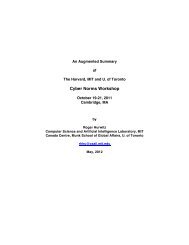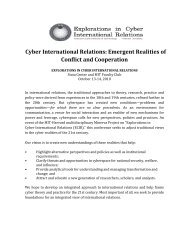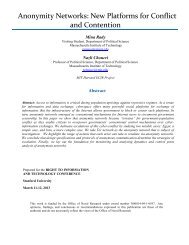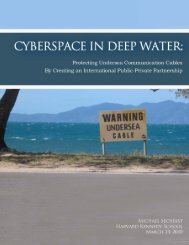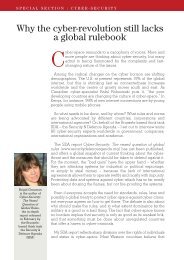Stewardship of Cyberspace: Duties for Internet Service Providers
Stewardship of Cyberspace: Duties for Internet Service Providers
Stewardship of Cyberspace: Duties for Internet Service Providers
Create successful ePaper yourself
Turn your PDF publications into a flip-book with our unique Google optimized e-Paper software.
HATHAWAY/SAVAGE: <strong>Stewardship</strong> <strong>of</strong> <strong>Cyberspace</strong>: <strong>Duties</strong> <strong>for</strong> <strong>Internet</strong> <strong>Service</strong> <strong>Providers</strong> 17<br />
most sophisticated individuals, groups, and even<br />
states. For example, in July 2009, the United<br />
States and South Korea fell victim to a DDoS<br />
attack against thousands <strong>of</strong> computers and major<br />
government, media, and financial websites. The<br />
attacks were launched from at least five differ-<br />
ent control hosts in multiple countries, including<br />
the United States. The United States government<br />
turned to industry to determine the origin and<br />
character <strong>of</strong> the threat and asked the ISPs to shut<br />
down the operations and restore services.<br />
In Germany, the Anti-Botnet-Advisory Center<br />
helps customers remove botnet threats and<br />
other malicious s<strong>of</strong>tware from their computers.<br />
The centre is supported by a group <strong>of</strong> ISPs that<br />
in<strong>for</strong>ms affected customers <strong>of</strong> their infections<br />
and then assists with specific tools to help the<br />
customer eliminate or eradicate the infection. 65<br />
The centre is working with Norton, Kaspersky,<br />
and Avira to provide tailored s<strong>of</strong>tware that<br />
“cleans” customer computers <strong>of</strong> malicious s<strong>of</strong>t-<br />
ware. Similarly, the Finish Communications<br />
Regulatory Authority (FICORA) directs network<br />
operators to disconnect the infected machines <strong>of</strong><br />
its customers from the <strong>Internet</strong> until the machine<br />
is disinfected. 66<br />
In late January 2012, the Polish government<br />
experienced multiple attacks targeting websites<br />
under the gov.pl domain. Most <strong>of</strong> the attacks were<br />
DDoS based, attributed to Anonymous, which<br />
declared radical protests after the Polish govern-<br />
ment revealed plans to sign the ACTA treaty on<br />
26 January. Websites <strong>of</strong> the Polish Parliament,<br />
Ministry <strong>of</strong> Foreign Affairs, and Internal Security<br />
Agency were among the victims <strong>of</strong> these attacks.<br />
Organizers enjoy the fact that DDoS attacks<br />
65 Safer <strong>Internet</strong> Surfing—Remove Threats,<br />
https://www.botfrei.de/en/ueber.html.<br />
66 Finnish Communications Regulatory Authority,<br />
http://www.ficora.fi/en/index/saadokset/ohjeet.html.<br />
are simple and efficient. You press a button<br />
and within seconds the targeted website stops<br />
responding. Minutes later news portals report<br />
about the incident. Collateral customers are then<br />
affected, including banks, media, telecommuni-<br />
cations companies, and Polish Railways. 67 Gov-<br />
ernments like Poland turn to their ISPs to assist<br />
in the defence <strong>of</strong> their infrastructure, and work<br />
proactively to establish countermeasures and<br />
incident response plans to mitigate and minimize<br />
the potentially devastating impact <strong>of</strong> a deter-<br />
mined and well-resourced opponent.<br />
As more <strong>of</strong> industry moves its services to an<br />
<strong>Internet</strong>-based infrastructure, one could envi-<br />
sion a digital crisis similar to the ash clouds<br />
over Iceland that halted air traffic around the<br />
world <strong>for</strong> days in the spring <strong>of</strong> 2010. While<br />
US laws focus on shielding from liability those<br />
who choose to help in a situation they did not<br />
cause, European laws criminalize failure to help<br />
in such a situation. 68 What if, <strong>for</strong> example, the<br />
e-ticketing <strong>of</strong> several major airlines and train<br />
systems was taken <strong>of</strong>f-line? The duty-to-assist<br />
obligation could be demanded to help restore<br />
that service so that passengers could be ticketed<br />
and tracked, and packages moved. This is not<br />
an impossible hypothetical situation because a<br />
reservation systems breakdown <strong>for</strong> United Air-<br />
lines in fact stranded thousands <strong>of</strong> passengers<br />
and disrupted flights around the United States in<br />
January 2006.<br />
Given the integrated and global nature <strong>of</strong> the<br />
<strong>Internet</strong> and the central role played by the large<br />
ISPs, it is incumbent on them to honour the duty<br />
to assist other ISPs both to warn <strong>of</strong> imminent<br />
danger, such as an emerging attack, and to<br />
67 “DDoS Against Polish Government Websites,”<br />
http://www.cert.pl/news/4856/langswitch_lang/en.<br />
68 Nancy Benac,. “Good Samaritan Laws Common in Europe but<br />
Rare in America,” Wisconsin State Journal (1997-09-05): 7A,<br />
ISSN 0749405X, Retrieved 2010-01-07. (Registration Required)



